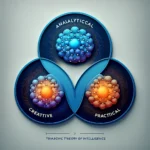**Sternberg’s Triarchic Theory of Intelligence**
—
**Definition:**
Sternberg’s Triarchic Theory, propounded by psychologist Robert J. Sternberg, presents a comprehensive framework for understanding human intelligence. It’s a pivotal concept in cognitive testing and psychology that examines intellectual capabilities beyond conventional IQ assessments.
—
**Analytical Intelligence:**
This component, also known as componential intelligence, pertains to the skills typically assessed by traditional intelligence tests and academic achievement. It encompasses the ability to analyze, evaluate, judge, compare, and contrast information. Analytical intelligence is key in problem-solving and the capacity to process information abstractly.
—
**Creative Intelligence:**
Also termed experiential intelligence, creative intelligence reflects the ability to use past experiences creatively to solve new and novel problems. It involves the capacity to think out of the box, adapt to changing environments, and come up with innovative solutions. In cognitive testing, creative intelligence assessments may involve tasks requiring invention or imaginative problem-solving.
—
**Practical Intelligence:**
Frequently referred to as contextual intelligence, practical intelligence entails the ability to understand and deal with everyday tasks and challenges. It is the application of intellectual skills in real-world scenarios, including the ability to adapt to, shape, or select environments. Practical intelligence is essential to evaluate how someone applies their knowledge concretely.
—
**Relevance in Cognitive Testing:**
In cognitive testing, Sternberg’s Triarchic Theory offers a broader perspective in assessing a person’s intellectual capabilities. It suggests that a complete assessment of intelligence should include tests that evaluate analytical, creative, and practical skills, providing a more in-depth understanding of an individual’s cognitive abilities.
—
**Application:**
Educational systems, psychological evaluations, and vocational assessments have incorporated Sternberg’s Triarchic Theory to develop more holistic testing approaches. Recognizing the multifaceted nature of intelligence through this theory promotes diverse learning and teaching strategies that account for different intellectual strengths and weaknesses.
—
**SEO Tags:**
Sternberg’s Triarchic Theory, Cognitive Testing, Analytical Intelligence, Creative Intelligence, Practical Intelligence, Intelligence Assessment, Holistic Intelligence Evaluation, Robert J. Sternberg, Componential Intelligence, Experiential Intelligence, Contextual Intelligence, Intelligence Quotient, Cognitive Psychology, Human Intelligence.
—
_End of Entry_

